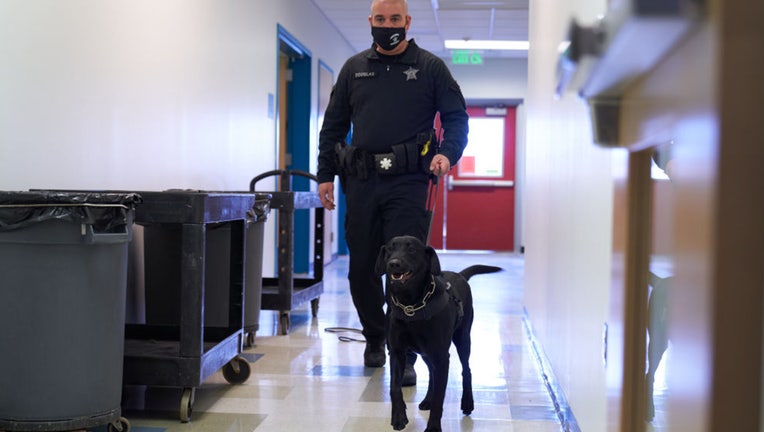Dogs sniffed out COVID-19 more accurately than some lab tests, study says

FILE - A Bristol County Sheriff's officer leads his Covid K-9 Hunter to sniff a hallway at Wood Elementary School in Fairhaven, Massachusetts, U.S., on Wednesday, Jan. 19, 2022. (Allison Dinner/Bloomberg via Getty Images)
A recent study out of France found that trained dogs were able to detect COVID-19 just as well, or even better, than a regular COVID-19 lab test.
Results of the study, which were published in the peer-reviewed journal Plos One on June 1, showed that dogs detected the virus with 97%-100% accuracy by smelling a participant’s sweat.
To compare, the nasal swab COVID-19 tests that were used in the study were only 84% accurate compared to the results yielded by the dogs.
Researchers conducted the experiment at the Alfort School of Veterinary Medicine using dogs loaned from a French fire department and from the Ministry of the Interior of the United Emirates.
A total of 335 (143 symptomatic and 192 asymptomatic) adults participated in the experiment. Using the nasal swab test, 109 out of 335 adults tested positive for COVID-19 and of those 109, 31 were asymptomatic.
The dogs were less accurate in detecting patients who tested negative for COVID-19 compared to the lab tests (90% v. 97%) but just slightly less, according to the study.
The study’s authors claimed the results of the experiment could provide a faster and less invasive alternative to detecting COVID-19 but noted the limitations such as the limited supply of properly trained dogs and some of the participants’ fear of the animals.
"Further studies will be focused on direct sniffing by dogs to evaluate sniffer dogs for mass pre-test in airports, harbors, railways stations, cultural activities or sporting events," researchers said.
It was also noted that the dogs were properly rewarded with toys and their welfare was "fully respected."
Dogs and COVID-19 detection in the U.S.
Meanwhile, in Massachusetts, the Bristol County Sheriff’s Office has become the first in the United States to deploy COVID-sniffing K-9s in the region.
"Huntah" and "Duke," 14-month-old Labrador Retrievers, work weekly across 15 school facilities in Bristol County searching and sniffing for the odor that COVID-19 leaves behind.
"It's giving the community a feeling of a little more security and know that at least if my child is going to school or my husband's working in an area, they’re not going to bring home COVID because law enforcement is proactively looking to sanitize where those things might pop up," Sheriff Thomas M. Hodgson told Fox News during an interview in January of this year.
Dr. Kenneth Furton, founder of the COVID K-9 detection program at Florida International University (FIU) in Miami, spent much of his life researching canine olfaction. He left no time to waste when the pandemic hit in March 2020, measuring a dogs’ reliability to detect COVID with a pure chemical called a universal detection calibrator (UTC).
"So we found on average that the dogs are 97.5% accurate, which is actually higher than PCR tests," said Dr. Furton, who is also the provost at FIU. He believes the COVID K-9 dogs have the potential to expand into other industries that expect large gatherings.
"If you were to have dogs screening people going onto a cruise ship, you would detect whether they have COVID right then, not doing a test days before," he said. "So here you have a great advantage in that regard."
In 2021, Early Alert Canines, located in Concord, California, launched a pilot program with the California Department of Health and the Association of Public Health Laboratories to sniff out COVID-19 from socks worn by previously infected patients.
The experts explained that in a human, most of the scent comes from the head, armpits, groin and feet.
"And in looking at those options, we went with feet," explained Early Alert Canines Executive Director Carol Edwards.
The dogs aren’t sniffing for the virus itself. Instead, their sense of smell picks up the chemical changes bodies produce when fighting COVID.
A dog’s sense of smell is 100,000 times more sensitive than that of a human’s, according to the American Kennel Club. This super nose makes dogs the perfect tools for sniffing out bodies, drugs and just overall dependable companions when trained properly to take on the tasks at hand.
FOX News and KTVU contributed to this report. This story was reported out of Los Angeles.

